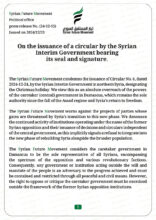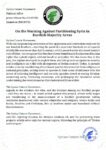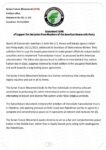Political officepress release / Statement of Political office
Statement on Bashar al-Assad’s Interview with Sky News Arabia

Syrian Future Movement (SFM)
Political office
Statement No (02-08-23)
Issued on: 10/08/2023
After listening to the televised interview, the Syrian Future Movement perceives the following:
- The journalist’s claim at the beginning of the dialogue that the interview is the first since the beginning of the events with an Arab channel is not a compliment but rather an insult to a puppet president who has lost the elements of governance, land, and people. He sold or mortgaged what remained to those he called allies, emphasizing the correctness of his alliance with them, while he lost and continues to lose his regional and especially Arab depth.
- The journalist deliberately mentioned the year 2012 as the beginning of the events, not 2011! This implies neglecting the Syrian popular and peaceful movement of 2011, which was met with oppressive security measures from the regime, leading the revolution in different directions.
- Bashar al-Assad emphasized that he personally was not targeted but the nation as a whole. This clearly indicates that he sees himself, like every dictator, as the nation, and any demand for him to step down means: “Either Assad or we burn the country!” Psychologists might have insights and perspectives to consider here.
- Not only did Bashar al-Assad downplay the number of demonstrators (who were in the millions)، but he reduced them to a hundred thousand or a bit more! As if the issue depends on the number and not the legitimate demands called for by Syrians. He falsified all the facts, ignoring what international media broadcasted then, and some of their correspondents –some of whom are still in Assad’s prisons– not to mention what was written by major international newspapers, which now serves as a significant archive.
- He reiterated his belief in the foreign conspiracy theory, which the people heard from him in his speech on 20/06/2011. This was another reason for them to continue their revolution after realizing their president is either detached from reality or indifferent to the people’s demands. If these demands were met, all that happened wouldn’t have occurred.
- Bashar al-Assad reiterated the correctness of the bloody security approach, which made the army confront the people and the protesters, confirming that if he could go back in time, he would choose the same approach! This makes us (as the opposition) and the Syrian Future Movement believe in our stance against supporting the Assad regime and our support for the people and their legitimate demands from the beginning until they are achieved.
- Bashar al-Assad believes he bears no responsibility for the killing, detention, or displacement of civilians, blaming it all on foreign countries and terrorism. This is another indication of his detachment from reality, considering Caesar’s photos, hundreds of documents talking about Syrians’ experiences with security agencies and intelligence basements, and their drowning in territorial waters escaping from his brutality.
- Assad again downplays the role of the Arab League, clearly indicating that he considers his return to it as a trap set for him, even being lured to it. Today, he turns his back on them before the quadrilateral ministerial committee meeting.
- In a characterization not unfamiliar to him, Bashar al-Assad describes the Syrian opposition as mere “oppositions!” – Even though they come together under the Syrian Negotiation Commission for instance -!! He differentiates between the domestically-manufactured opposition and the external opposition, continuing an old narrative whose purpose is to accuse every opponent of being a foreign agent. Even the domestically-manufactured opposition, he does not deny the possibility of them being agents for foreign entities! Hence, this opposition is essentially dead before it even gets a chance to live. He also indicated that some of the external opposition might actually be working for the inside (hinting indirectly at them working for the Syrian regime from one side, which is plausible) and his attempt to sow doubt within us (the opposition) about the integrity of one and the allegiance of another.
- Assad mentions that around half a million Syrian refugees have returned to Syria, claiming that the primary obstacle preventing others from returning is the lack of basic living necessities for the general population. This is a clear admission from him about the deteriorating conditions in areas under his control. Any citizen who had to leave their homeland and was fortunate enough to live in another country – those respects individual and provides for their comfort – cannot return to live in their motherland, Syria, because of the policies of its president and the governance system. On the other hand, with such remarks, he covers up the truth about the fear of his security forces and their oppressive practices, extortion, imprisonment, and the fear of forced conscription where they might have to bear arms against their own compatriots (possibly brother against brother).
- Assad again denies his involvement in the Captagon issue, disregarding all the security reports and international intelligence data (the latest being hundreds of recorded calls on this matter and his partnership with Hezbollah in Lebanon). This resulted in accusations against Bashar al-Assad personally for investing in and trading drugs, even calling him the “Captagon King.”
On another note, this statement is a clear provocation to all Arab countries that expected, as a result of Syria reclaiming its position, that it would fight the drug trade and exports, which have now invaded their countries coming from Syria or from Lebanon through Syria. The latest was a high-profile meeting attended by the head of the Syrian Future Movement in London a few weeks ago, titled: “Assad and the Captagon Trade.” - Assad portrays himself as Superman, as usual, pointing out that the main reason for the country’s situation is his refusal of Western dictates that would have undermined the independence of national decisions. We believe the main reason lies in not listening to the people’s demands from the start, and prioritizing the interests of the Assad – Makhlouf family over the entire nation’s interests.
For the record, at that time, we in the Syrian Future Movement were well-aware of most of the Western demands, which were calling for comprehensive political reforms, including the granting of freedoms and the non-violent handling of protesters. - Assad absolves Iran from Israeli strikes, taking on the responsibility to respond from their credit with him, which has become incalculable. In doing so, he provides a free service to Iran, exempting it from the consequences of responding to Israeli attacks.
- One can say that the relations between the Syrian regime and Turkey have currently been severed, and the Russian efforts to find a settlement have gone in vain. Thus, the Syrian opposition becomes a relevant card that Erdogan and his government can benefit from. It’s essential for the forces of the Syrian revolution and opposition to reassess its actual value in the international market and within the new data.
- Assad’s accusation that Turkey is a manufacturer and supporter of terrorism, and that it occupies Syrian land, is dangerous and may lead us to talk about potential confrontations between the two sides in the future (whether directly or through intermediaries)، overlooking the complex Syrian reality and current international understandings.
- Accusing Hamas (an ally of Iran) of having a treacherous stance (a sentiment unfortunately shared with a segment of the Syrian opposition) puts Hamas in an awkward position and prompts it to reevaluate its choices and its strategic depth.
- In a foolish statement, Assad claims that his regime is overcoming the ramifications of the Caesar Act, while at the same time he cannot justify the continuous alarming economic decline in his territories. Assad dismisses all analyses and statements of his officials who claim the reason for economic decline is the Caesar Act.
- It’s impossible to interpret Assad’s statement that he doesn’t interfere in Lebanon today as anything but the exact opposite. Today, Assad infiltrates Lebanon through a front of allies, chiefly Hezbollah and the Shiite Amal Movement, in addition to his Christian, Druze, and some Sunni economic and religious leadership allies. Perhaps the only name he mentioned in his interview was “Suleiman Frangieh”, a name with an objective known to politicians and the presidency in Lebanon.
- Bashar al-Assad lies in the interview when he assures viewers that “Hafez al-Assad, his father” did not play a role in his rise to the presidency. Many who were close to him, both before and after his presidency, including the head of the Syrian Future Movement, know the pathways and doors “Hafez al-Assad” opened for his son “Bashar” to become president and his keenness to hastily prepare him to fill the void after his death.
- Assad insists on playing the chord of the Syrian people’s support for him. In reality, when the people turned their backs on him and called for the overthrow of his regime, threatening his security in the Presidential Palace, he had no choice but to seek help from Iran and Russia for protection and support. Without their help, he would have been history by now.
- One can say that comparing “Bashar al-Assad’s” relationship today with his son to his (Bashar’s) past relationship with his father “Hafez al-Assad” rings alarm bells about the danger of inheriting power to “Hafez Junior al-Assad”, especially after the amended Syrian constitution determined the age of the president and the number of years of his rule.
- Bashar al-Assad says he didn’t make his decisions from the beginning out of conviction but to convince his opponents of the correctness of his vision. We wonder if he pleased his internal opponents or even his supporters? Did he satisfy his foreign allies or even his enemies? Or did he satisfy his father in his grave, whom he denied and forsook his favor upon him (who seated him on a throne built on the skulls of Syrians and their bones(.
Upon a quick review of all of the above and the discussions around it in the interview, we can say: The head of the Syrian regime, “Bashar al-Assad,” tells everyone near and far that he has not and will not change, that the whole world conspires against him while he defends the country’s borders and the people’s right to a decent life, and that everything you hear, read, or see is merely a figment of imagination and the stuff of dreams!! All this is facilitated by:
- Our weakness as an opposition, our fragmentation, and the absence of a shared vision.
- The world’s betrayal of our justified cause, including many Arab and neighboring countries at the forefront.






